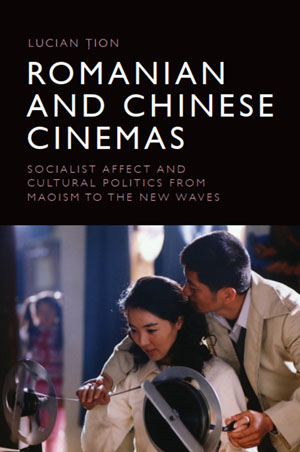Romanian and Chinese cinemas
A radical reimagining of postcolonial, postsocialist cinema, Lucian Țion’s book unveils a shared miserabilist aesthetic linking socialist-era and New Wave films across Eurasia. Challenging Western-centric narratives, Țion argues socialist-era directors subverted propaganda through social critique, forging continuity between 1980s social realism and the minimalism of Jia Zhangke and Cristi Puiu.
Please note: You can only join online via Zoom!
The Book Talk
Lucian Țion’s groundbreaking study Romanian and Chinese Cinemas repositions the cinematic histories of two seemingly disparate cultures, revealing their shared aesthetic and political history, forged under socialism. Challenging Western-centric narratives that dismiss socialist-era cinema as mere propaganda, Țion identifies a transnational Eurasian tradition rooted in miserabilism—a bleak, critical realism echoing Third Cinema’s dissent. Through comparative analyses of films from Maoist China and Ceaușescu’s Romania to the two countries subsequent New Wave movements, the book uncovers how directors like Jia Zhangke, Cristi Puiu, and Corneliu Porumboiu inherited social realism (and subverted the dogmas of earlier socialist realism) to critique present neoliberal decay. By juxtaposing forgotten films like Bridge (1949) and Reverberates the Valley (1950) with modernist experiments and postsocialist masterpieces (Platform, 2000; The Death of Mr. Lăzărescu, 2005), Țion exposes an enduring dialogue between state ideology and artistic riposte. Rejecting the “World Cinema” paradigm that marginalizes non-Western narratives, this bold work reimagines postcolonial Eurasia as a cohesive cultural space, urging scholars to confront the continuity linking socialist dogma to contemporary critiques of capitalism. A vital intervention for film studies, postcolonial theory, and Cold War cultural history.
The Speaker/Author
Lucian Țion is a lecturer at University of Amsterdam and Babeș Bolyai University and holds a PhD from the National University of Singapore. His research areas include East European cinema and culture, Chinese cinema, and postsocialist/postcolonial studies. His articles were published in Quarterly Review of Film and Video, Studies in Eastern European Cinema, Senses of Cinema and Bright Lights Film Journal, among others. His contributions further include chapters in co-edited volumes such as Bloomsbury’s Third Cinema, World Cinema and Marxism (September 2020), and Cold War II: Hollywood’s Renewed Obsession with Russia, (University Press of Mississippi, December 2020).
